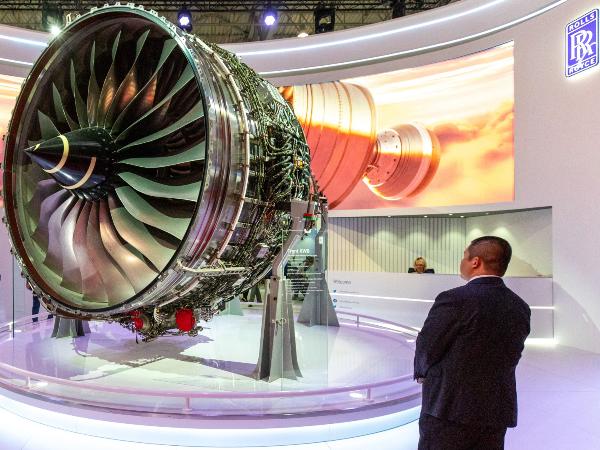Rolls-Royce share price plunges 20% but anticipates sustainable growth
Rolls-Royce's share price fell 20% to 96p yesterday as CEO Warren East announces his departure. Meanwhile, the Ukrainian crisis threatens further disruption to the company's key civil aerospace division.
 Source: Bloomberg
Source: Bloomberg
Rolls-Royce's (LON: RR) share price has now recovered to 107p, surfing just above penny stock status. This is dangerous territory for the FTSE 100 operator as it trades on its reputation as a British hallmark of quality.
But Rolls-Royce was worth 375p in August 2018. And the aerospace company could be on track to return to this pre-pandemic high.
Rolls-Royce share price: full-year results
Rolls-Royce made a £124 million profit in 2021. This is a far cry from the £3billion 2020 loss it suffered as lockdowns and grounded planes saw demand for the company’s lucrative civil aerospace division collapse. And the company’s £1.3 billion cost-cutting program has been completed a year early. With 9,000 jobs axed, the company believes itself a ‘better balanced and more sustainable business.’
But falling engine deliveries saw revenue decline from £11.49 billion to £11.22 billion in 2021, while net debt leapt by £1.6 billion to more than £5 billion. However, much of this additional debt can be accounted for by its £1.2 billion spend on ‘R&D on market-leading technology for new and existing markets.’ Moreover, after two years of cash burn, Rolls-Royce expects a modest increase in revenue and a ‘modestly positive’ free cash flow in 2022.
However, with HSBC predicting the UK base rate will rise to 1.25% by the end of the year, the company is now under huge pressure to deliver a return its increasingly costly investments.
But Rolls-Royce said its disposals program is ‘on-track’ to deliver expected proceeds of £2 billion. And CEO Warren East believes ‘we have improved our financial and operational performance, continued to deliver on our commitments and created a better balanced business capable of sustainable growth.’
 Source: Bloomberg
Source: Bloomberg
Rolls-Royce shares: short-term, long-term
However, East is stepping down at the end of 2022. While unexpected, he thinks the company will soon generate ‘substantial business growth, including through the creation and nurturing of new businesses with very significant potential.’
And the numbers back him up. Defence income rose by £155 million to £3.37billion in 2021, driven by ‘strong demand in all our markets.’ And it's also possible that the shock caused by the Ukrainian crisis will spark significantly higher government defence spending.
Meanwhile, with Brent Crude already at $100 a barrel, Investec’s Martin Young speculates that UK energy bills could hit £3,000 a year as the crisis escalates. This will make Rolls-Royce’s recently announced mini nuclear reactors both more cost-effective and more popular, as public opinion towards nuclear power is swayed by the rising cost of energy. As East says, ‘our new businesses in electrical power and small modular reactors…have the potential to create very significant long-term value.’
And as the march towards net-zero continues, its all-electric ‘Spirit of Innovation’ plane recently broke two world speed records, hitting an average of 555.9km/h over 3km. East called the record a ‘fantastic achievement…that will help make ‘jet zero’ a reality.’
These divisions could all help send the Rolls-Royce share price soaring. But its crown jewel is its civil aerospace division, responsible for manufacturing and maintaining civilian aircraft engines. Pre-pandemic, the division was responsible for half of the company’s revenue, but this has now fallen to roughly one third. In 2021 alone, civil aerospace revenue fell by £491 million to £4.54 billion. But this year, East is hoping ‘to capitalise on increasing international travel.’
However, loosening global pandemic travel restrictions are now being replaced by sanctions on and from Russia as the depressant on Rolls-Royce’s recovery. Russia’s Aeroflot, whose engines are supplied and maintained by the company, has been banned from UK airspace. And East accepts ‘sanctions are sanctions. I don’t think we’ll be servicing those engines any time soon.’ In retaliation, Russia has banned all UK civilian aircraft from its airspace saying blaming ‘the unfriendly decisions by the UK aviation authorities.’
Moreover, Rolls-Royce gets 20% of the titanium it needs to build jet engines it builds from Russia. But East knows he ‘won’t be taking titanium from Russia for some time,’ and is instead sourcing the metal from other countries. However, Russia’s VSMPO-AVISMA is the world’s largest titanium sponge producer. With sanctions are expected to escalate, a potential export bar could send its price rocketing.
In the short term, Rolls-Royce continues to display the volatility associated with a penny stock. And with the Ukrainian crisis causing continued uncertainty, further short-term volatility seems inevitable.
But East believes ‘disciplined investments to develop new and existing technologies will enable us to seize the significant commercial opportunity presented by the global energy transition.’
In the long-term, the Rolls-Royce share price could return to its pre-pandemic high.
Go short and long with spread bets, CFDs and share dealing on 16,000+ shares with the UK’s No.1 platform.* Learn more about trading shares with us, or open an account to get started today.
* Best trading platform as awarded at the ADVFN International Financial Awards 2021




0 Comments
Recommended Comments
There are no comments to display.
Create an account or sign in to comment
You need to be a member in order to leave a comment
Create an account
Sign up for a new account in our community. It's easy!
Register a new accountSign in
Already have an account? Sign in here.
Sign In Now